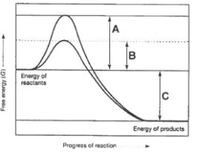
AP Bio Unit 6 Enzymes & Energy
Quiz
•
Biology
•
9th - 12th Grade
•
Medium
Standards-aligned
Danielle Schroeder
Used 1K+ times
FREE Resource
Enhance your content
20 questions
Show all answers
1.
MULTIPLE CHOICE QUESTION
30 sec • 1 pt
Tags
NGSS.HS-PS1-4
2.
MULTIPLE CHOICE QUESTION
30 sec • 1 pt
Tags
NGSS.HS-PS1-4
3.
MULTIPLE CHOICE QUESTION
30 sec • 1 pt
Tags
NGSS.HS-LS1-6
4.
MULTIPLE CHOICE QUESTION
30 sec • 1 pt
5.
MULTIPLE CHOICE QUESTION
30 sec • 1 pt
The active site of an enzyme can:
bind allosteric regulators.
bind competitive inhibitors.
bind non-competitive inhibitors.
change the Gibbs Free Energy of the reaction.
6.
MULTIPLE CHOICE QUESTION
30 sec • 1 pt
Which of the following do not affect enzymes ability to function?
pH
substrate concentration
temperature
water
7.
MULTIPLE CHOICE QUESTION
30 sec • 1 pt
In general, enzymes do NOT:
bind permanently to their substrates
have names ending in -ase
have their function changed with extremely high temperatures
react with a specific substrate
Create a free account and access millions of resources
Create resources
Host any resource
Get auto-graded reports

Continue with Google

Continue with Email

Continue with Classlink

Continue with Clever
or continue with

Microsoft
%20(1).png)
Apple
Others
By signing up, you agree to our Terms of Service & Privacy Policy
Already have an account?
Similar Resources on Wayground

15 questions
Biology Honors Enzyme Review
Quiz
•
9th Grade

15 questions
Enzymes
Quiz
•
9th Grade

20 questions
AP Bio Final Rev Biochem
Quiz
•
10th - 12th Grade

15 questions
EXPRESSION OF BIOLOGICAL INFORMATION
Quiz
•
12th Grade

16 questions
Synapse
Quiz
•
10th Grade

16 questions
Cell-Cell Communication AP
Quiz
•
11th Grade - University

16 questions
RNA
Quiz
•
KG - University

20 questions
MCQ on Bio-molecules
Quiz
•
11th Grade - University
Popular Resources on Wayground

20 questions
Brand Labels
Quiz
•
5th - 12th Grade

10 questions
Ice Breaker Trivia: Food from Around the World
Quiz
•
3rd - 12th Grade

25 questions
Multiplication Facts
Quiz
•
5th Grade

20 questions
ELA Advisory Review
Quiz
•
7th Grade

15 questions
Subtracting Integers
Quiz
•
7th Grade

22 questions
Adding Integers
Quiz
•
6th Grade

10 questions
Multiplication and Division Unknowns
Quiz
•
3rd Grade

10 questions
Exploring Digital Citizenship Essentials
Interactive video
•
6th - 10th Grade
Discover more resources for Biology

20 questions
Cell Organelles
Quiz
•
9th Grade

20 questions
Cell Transport
Quiz
•
9th Grade

20 questions
Cell organelles and functions
Quiz
•
10th Grade

22 questions
Cell Cycle and Mitosis
Quiz
•
9th Grade

20 questions
Cell Organelles
Quiz
•
9th Grade

25 questions
photosynthesis and cellular respiration
Quiz
•
9th Grade

16 questions
AP Biology: Unit 1 Review (CED)
Quiz
•
9th - 12th Grade

20 questions
Biomolecules
Quiz
•
9th Grade
